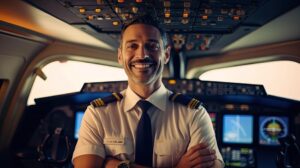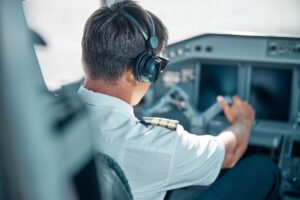Have you ever imagined yourself at the controls of a massive airplane, guiding it through the endless blue skies? If you get excited about the idea of flying across the clouds, then being a commercial pilot could be your ideal career path. Imagine yourself traveling to far-off places, getting to know interesting people, and enjoying the rush of flight on a daily basis.
We’ll share the strategies in this post to make this goal come true and provide a detailed walkthrough for becoming a commercial pilot in India. So grab a seat, get ready for an amazing tour through the fascinating world of aviation, and discover how to become a commercial pilot.
Who is a Commercial Pilot

A commercial pilot is a professional who operates an aircraft to transport passengers or cargo for commercial purposes. In addition, they have the ability to do other vital duties like traffic observation, emergency assistance, and even aerial firefighting.
Because they are responsible for everyone’s safety during the flight, commercial pilots have a great deal of responsibility. A commercial pilot must possess extensive knowledge of aircraft, including how to operate and maintain safe flying conditions. In places like India, the government has made sure that people who want to be pilots can get the training they need.
Types of commercial pilots
- Airline Transport Pilot (ATP): ATPs are the backbone of commercial aviation, operating large passenger aircraft for scheduled airlines. Before becoming airline pilots, they frequently began their careers as flight instructors or in other aviation-related professions. They have vast expertise and endure rigorous training.
- Flight Instructor: In training the upcoming generation of pilots, flight instructors are extremely important. With their instructor ratings and commercial pilot licenses, they can coach aspiring pilots in flight.
- Cargo Pilot: Cargo pilots are responsible for the transportation of goods and freight via air transport. They operate cargo aircraft, ranging from small cargo planes to large freighters, ensuring the timely and secure delivery of cargo to its destination.
- Charter Pilot: Charter pilots provide personalized air travel services to individuals, businesses, and organizations. They work for companies that own or operate private aircraft, flying clients to destinations of their choice on a charter basis. Charter pilots offer flexibility in flight schedules and routes, catering to the specific needs and preferences of their clients.
- Helicopter Pilot: Helicopter pilots specialize in flying rotorcraft for a variety of purposes, including transportation, aerial inspections, and specialized missions such as search and rescue operations.
Also Read: Procedure to Get a Private Pilot’s License in India
Steps for How to Become a Commercial Pilot
1. High School Requirements:
Candidates must have Physics and Mathematics as compulsory subjects in their High school (10+2) level. These subjects lay the groundwork for understanding flying principles and aerodynamics.
In case you did not have these subjects in 12th you will have to apply to National School of Open Learning and appear for an exam and get a passing certificate for the particular subject.
2. Medical Examination:
Prospective pilots must clear a Class 1 medical examination or its equivalent to ensure they are physically and mentally fit to fly. Good health is essential for safely operating an aircraft.
3. Flight Training Organization:
Candidates need to undergo flying training from an authorized Flight Training Organization recognized by the Civil Aviation Authority. They must accumulate a minimum number of flying hours to qualify for a commercial pilot’s license.
4. Theory Examinations:
Aspiring pilots must pass various theory examinations relevant to their license type. These exams cover topics such as aviation meteorology, navigation, air regulations, and technical aspects of flying. Preparation for these exams is crucial, and candidates may seek assistance and resources for effective study.
5. Flying Checks:
Before applying for a Commercial Pilot’s License, candidates must complete all required flying checks to demonstrate their proficiency in operating aircraft safely.
6. Career Pathways:
Once licensed, pilots can choose between two pathways. They can pursue a Type Rating if aiming to join an airline, or obtain an Instructor Rating if interested in flight instruction.
To prepare for a career as a Commercial Pilot:

1. Education:
Achieve a 12th standard examination in Physics, Chemistry, and Mathematics. Although not mandatory, having an academic degree in fields such as aviation engineering or aeronautical engineering may be beneficial.
2. DGCA Approval:
Obtain a Commercial Pilot License (CPL) from the Directorate General of Civil Aviation (DGCA) under the Government of India. Join a DGCA-approved training institute and pass the written test conducted by these institutes.
3. Medical Fitness:
Undergo a medical examination according to DGCA Class 1 medical assessment rules to ensure fitness for flying.
4. Flying Experience:
Complete a minimum of 200 hours of flying to qualify for a commercial pilot license. Additionally, pass theory papers conducted by aviation academies to meet CPL eligibility criteria.
Important characteristics for becoming a good Commercial Pilot
- Decision-making abilities: To protect the safety of passengers and crew, commercial pilots must make swift, precise judgments under pressure, frequently with little information.
- Fitness: To carry out their jobs efficiently and safely during flight operations, commercial pilots must maintain their physical, mental, and emotional well-being.
- Communication skills: For safe and effective flight operations, crew members and air traffic control must communicate effectively.
- Time management: To keep flights on schedule and do all required activities, commercial pilots need to have good time management skills.
- Composure and calmness: Pilots must be able to retain composure in order to keep control of the aircraft and guarantee everyone’s safety, especially in stressful situations.
What subjects one needs to study to Become a Commercial Pilot
- Cockpit Resource Management (CRM): Understanding how to efficiently manage resources and work as a team in the cockpit to ensure safe and effective flight operations.
- Air Regulations: Learning about the rules and regulations governing aviation, including air traffic control procedures, airspace restrictions, and international aviation laws.
- Airframes and Engines: Studying the structure and mechanics of aircraft, including aerodynamics, propulsion systems, and aircraft systems.
- Aviation Meteorology: Understanding weather phenomena relevant to aviation, such as cloud formations, atmospheric pressure, wind patterns, and how weather conditions impact flight operations.
- Air Navigation: Learning navigation techniques and principles, including reading charts, using navigational aids, calculating course corrections, and conducting in-flight navigation.
- Flight Planning: Acquiring skills in flight planning and preparation, including calculating fuel requirements, determining optimal flight routes, considering airspace restrictions, and evaluating weather conditions for safe flight.
Conclusion
In conclusion, pursuing a career as a commercial pilot is a thrilling path that calls for commitment, diligence, and meeting certain requirements established by aviation authorities. Prospective pilots face a variety of obstacles and opportunities as they pursue a career that includes fulfilling educational requirements, gaining licenses, and going through extensive training. For those who have a passion for aviation, becoming a commercial pilot is a worthy endeavor, despite the challenging training and exciting opportunities it offers to travel the skies.
FAQ
1. How long does it take to become a commercial pilot?
Flying training can take less time if you do it from abroad. In India, it typically takes 18–24 months to obtain a commercial pilot’s license (CPL), while in the USA it takes 8–12 months. In the US or Canada, it can take 5–6 months to complete CPL training.
2. Is there an age limit to become a commercial pilot?
Yes, aspiring commercial pilots must be between 18 and 35 years of age to apply for pilot training programs in India. However, age requirements may vary slightly depending on the specific airline or training institute.
3. What is the cost involved in becoming a commercial pilot?
The cost of pilot training can vary widely depending on factors such as the flight school, type of aircraft used for training, and location. On average, the cost of obtaining a Commercial Pilot License (CPL) in India can range from Rs 38–45 lakh. Additionally, aspiring pilots should budget for medical examinations, theory exams, and other associated expenses.
